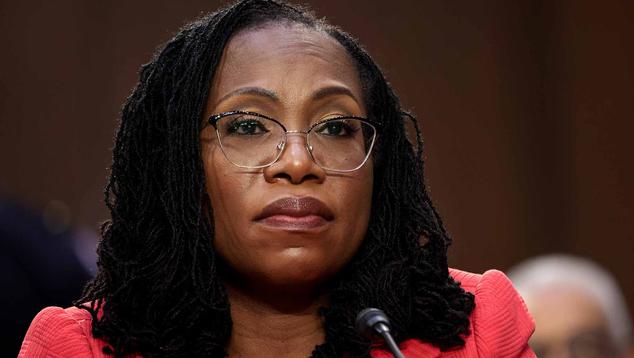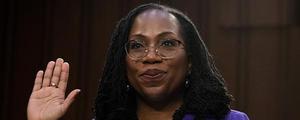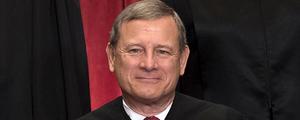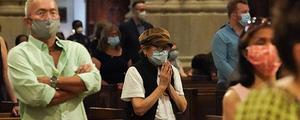In her Senate Judiciary confirmation hearings in March, Supreme Court nominee Ketanji Brown Jackson was asked by South Carolina Sen. Lindsey Graham, "What faith are you, by the way?" Jackson replied that she was a nondenominational Protestant.
Jackson, who was confirmed by the Senate on Thursday, will be only the second Protestant on the high court when she joins the court this summer, along with Neil Gorsuch (who is Episcopalian but was raised Catholic). The justice whom Jackson will replace, Stephen Breyer, is Jewish, as is Elena Kagan, who remains on the court. The remaining six justices -- John Roberts, Clarence Thomas, Samuel Alito, Sonia Sotomayor, Brett Kavanaugh and Amy Coney Barrett -- are Catholic. Thus, the court will consist of six Catholics, two Protestants, and one Jew.
This is not reflective of the U.S. population, as has been widely discussed in recent years. Our latest estimate from over 15,000 Gallup interviews conducted from January 2021 through March of this year shows that about 22% of the adult population identifies as Catholic, as opposed to the 67% Catholic representation on the court. Two percent of the population identifies as Jewish (Kagan represents 11% of the nine justices). The biggest disproportionality comes in terms of Protestants. About 45% of Americans are non-Catholic Christian, or Protestant, compared with what will be 22% Protestant representation on the court.
There is also a completely missing constituency on the court, the "nones," or those who when asked say they have no formal religious identity. About 21% of the U.S. population are nones (and another 3% don't give a response when asked about their religion), according to Gallup data. The rise of the "nones" represents a major change in American religious identity over the past decades, although this is not evident in terms of Supreme Court justices. All of the justices on the court have a religious identity based on available evidence, although we don't have survey data in which each justice is asked the same religious identity question as pollsters use for the population as a whole.
Jackson's self-identification as a "nondenominational" Protestant also reflects an increasingly prevalent trend within the Protestant segment. Fewer non-Catholic Christians now identify with established Protestant denominations (for example, Baptist, Methodist, Presbyterian, Lutheran), and more who are not Catholics simply say they are Christian or nondenominational. At the same time, Jackson's use of the word "Protestant" itself is less common than it used to be, particularly among young people. Non-Catholic Christians 18-29 years old in our 2021-2022 Gallup data are about as likely to say they are nonspecific Christian as to say they are Protestant, while older non-Catholic Christians, particularly those 65 and older, are much more likely to stick with "Protestant." Similarly, a recent analysis by researcher Ryan Burge in the Journal for the Scientific Study of Religion concluded, "The term 'Protestant' is becoming increasingly unfamiliar to younger Americans, especially for racial minorities."
Political Orientation in Relationship to Religious Identity
Five of the six Catholics on the court (Roberts, Thomas, Alito, Kavanaugh and Barrett) were nominated by Republican presidents, while Sotomayor is the only Catholic justice nominated by a Democrat (Barack Obama). This might suggest a relationship between Catholicism and Republicanism, if we are willing to make an inference about the justices' political orientation based on the party of the president who nominated them. But the data for the general population show that Catholics do not skew Republican; rather, they skew modestly Democratic, mirroring the political identity of the U.S. population as a whole.
Gallup's 2021-2022 data show that 43% of Catholics identify with or lean toward the Republican Party, while 50% identify with or lean toward the Democratic Party, compared with 44% Republican and 47% Democrat for the overall population. The Catholics on the court, in other words, are somewhat out of sync with the population, in that most would be presumed to be Republicans, based on the party of the president who appointed them.
The one White Protestant on the court, Gorsuch, was nominated by a Republican, which does fit with population tendencies. About two-thirds of U.S. White Protestants identify with or lean Republican, way above the national average. Jackson, who will be the one Black Protestant on the court, was nominated by a Democrat, which also fits the national data. Black Americans are majority Protestant in their religious identity and are strongly likely to identify with or lean Democratic (almost eight in 10 Black Protestants identify as Democrats). The sole Jewish justice, Kagan, was nominated by a Democrat, which also reflects the underlying population. Jews in the U.S. are highly likely to identify with or lean to the Democratic Party.
In summary, based on projections from the general population and assumptions about the justices' political leanings, we would expect the Catholics to be about half Republican and half Democratic (which isn't the case); the one White Protestant to be Republican (which is the case); the Black Protestant to be Democratic (which is the case), and the Jewish member to be Democratic (which is the case).
Inferences About the Personal Religiosity of the Justices
Of course, there is a difference between religious identity and religious intensity. One's religious identity can be largely independent of the degree to which one's religion guides daily thinking and decision-making. This is an important consideration, given that interest in the justices' religion swirls mainly around considerations of the impact of their religion on their judicial decision-making.
There is, to my knowledge, no systematic assessment of the importance of religion for each justice. There are, however, some inferential indications of the religiosity of justices based on their confirmation hearings and other reporting. Justice Barrett, for example, reportedly has described herself as a "faithful Catholic"; Kavanaugh said he was an active Catholic in his confirmation hearing; Gorsuch and his wife were active members of an Episcopalian church in Colorado before his confirmation; and Thomas was a Catholic seminarian early in his life. A New York Times report back in 2009 indicated that Justices Roberts, Thomas and Alito were "committed attenders of Mass," but that Sotomayor was more of a cultural Catholic than a practicing Catholic.
The religiosity of new Justice Jackson is not known. Sen. Graham, continuing in his pollster mode, asked Jackson how religious she was ("On a scale of 1 to 10, how faithful would you say you are in terms of religion?"). Graham evidently was following the same line of questioning used by Democrats when they probed Amy Coney Barrett on her religiosity in her confirmation hearings in 2020. Jackson demurred in her response, saying, "I am reluctant to talk about my faith in this way just because I want to be mindful of the need for the public to have confidence in my ability to separate out my personal views." Jackson did invoke her faith and belief in God more generally at several times during the hearings. U.S. News and World Report conducted a search of available public records about Jackson and could find no record of her having a church membership or being affiliated with any particular church. So the exact nature of her religiosity remains unclear.
Based on extrapolations from general population data, we would expect the two Protestants on the court, Gorsuch and Jackson, to be the most religious, because Protestants are the most religious major religious segment in the country except Mormons (based on self-reported religious service attendance). Black Protestants, in turn, are somewhat more religious than White Protestants. We would expect the six Catholics on the court to be about average in terms of their religiosity, because Catholics are no more likely than the overall population to report frequent church attendance (although fewer Catholics than the general population say they "never" attend church services). And the one Jewish member, Kagan, should be the least religious, at least in terms of religious service attendance. Jews as a group in the U.S. are the least religious of any major religious group in Gallup data.
Congress More Representative Than Supreme Court Justices
Interestingly, members of Congress are somewhat more representative of the U.S. population in their religious identity than are Supreme Court justices. Pew Research used data collected by CQ Roll Call to estimate the religious composition of the 117th Congress. Like the court, almost all members of Congress have a religious identity, which, like the court, puts Congress at odds with the general population, among whom less than 80% have a religious identity. Pew reports that of the 531 members of Congress and the Senate seated in early 2021, only one said they were religiously unaffiliated, although the religious identity of another 3.6% couldn't be established.
Given this relatively low percentage of nones in Congress compared with the U.S. population, other religious groups have to be proportionally higher, as is in fact the case. Unlike the Supreme Court, which is disproportionately Catholic, the percentage of Catholics in Congress (30%) is just modestly higher than the population's percentage of Catholics. Also unlike the Supreme Court, which is way underrepresented in terms of Protestants, the 55% of Congress who identify as Protestant or non-Catholic Christian is somewhat higher than the general population. Finally, while the 6% of members of Congress who are Jewish is low in absolute terms, it is three times the percentage of Jews in the general population.
To stay up to date with the latest Gallup News insights and updates, follow us on Twitter.




